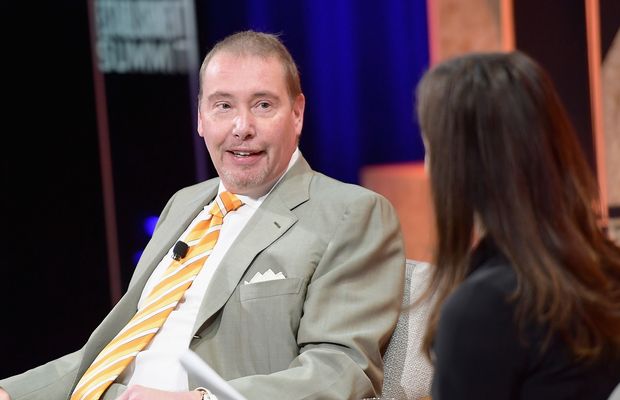
DoubleLine Capital CEO Jeffrey Gundlach in 2017 (Photo by Matt Winkelmeyer/Getty Images)
Getty Images
Donald Trump is most likely to win re-election, but no matter the outcome of the presidential race, the U.S. could find itself broken into more than one country as unrest and acrimony grip the electorate, noted investor Jeffrey Gundlach said Monday.
Speaking on a webcast hosted by Rosenberg Research with its founder, David Rosenberg, Gundlach said he had “far less conviction” about Trump than in 2016, when he was one of a handful of people taking Trump’s long-shot candidacy seriously.
Gundlach has previously shared his views on the election, but in conversation with Rosenberg, a noted economist, he also weighed in on the prospects for the economy if Washington isn’t able to deliver a big enough fiscal aid package. “The economy is already in tatters, but it would be a disaster,” he said. “When you use such blunt instruments, like the money spray, the effects for the economy are quite uneven. There’s a big tremor but then there are aftershocks.”
Perhaps more ominous than any outcome he expects over the next year or so, however, is Gundlach’s slightly longer-term outlook.
Could America lose faith with democracy? “People are strongly committed to the concept of democracy and yet China has had massive growth and way better infrastructure under totalitarianism,” Gundlach mused. “What are we doing when our outcomes are inferior? Is it possible we could change in that regard? Yes, it is possible. I think we are going to see substantial changes in the next six years.” That might even include the U.S. breaking into more than one country, he said.
That’s actually a nice analogue for how Gundlach feels about financial markets.
“We’re going to break away from a paradigm we’ve been in” for the past decade or so, he said, which was characterized by what Pimco dubbed “the new normal”: 2-2.5% GDP growth, stable inflation, and very low market volatility.
“2017 was the most sedate stock market of all time. It got to be so consistent that a narrative developed that the market had structurally changed. There was a narrative that the VIX VIX, -2.34% would not go above 15 again.”
The VIX, or Cboe Volatility Index, measures expected volatility for the S&P 500 in the coming 30-day period. It stood near 37 late Monday, well above its long-term average near 19.
Now, Gundlach said, “I think we’re going to move into an area that has fat tails.” Skyrocketing inflation is just as likely as disinflation or outright deflation, he thinks.
See: ‘Anything can happen:’ Why the hottest investing trend is playing it safe
“I hate long bonds TMUBMUSD30Y, 1.623%, but I still think you’re supposed to own some, and in a deflationary environment, you would want your portfolio to have that hedge,” he said.
What’s more, as the dollar DXY, +0.02% weakens, gold GLD, +0.97% will also provide a good hedge. And after the outperformance of U.S. equities SPX, +1.23% for the past decade, emerging markets — particularly India — are a better place to put money than the U.S. or Europe, which Gundlach called “bad demographics, not very well-run, and vulnerable to another Brexit-type outcome.”
Rosenberg Research, launched just weeks before the pandemic-induced lockdowns began, has hosted several such webcasts for clients, and plans more in the coming weeks.










Add Comment